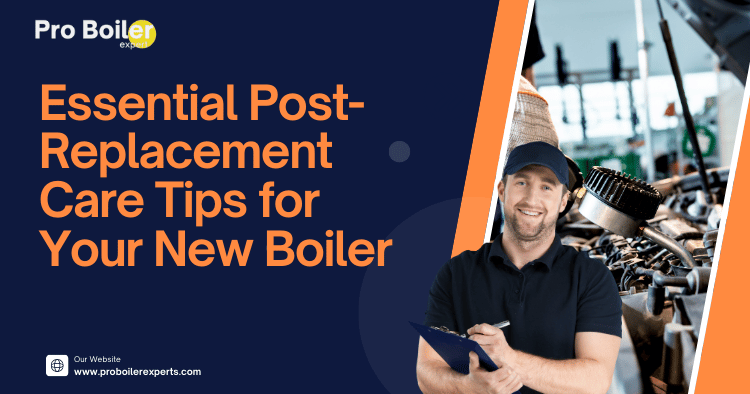Table of Contents
- Introduction
- Understanding Your New Boiler
- Regular Maintenance Schedule
- Monitoring Boiler Performance
- Troubleshooting Common Issues
- Safety Precautions
- FAQs
- Conclusion
Introduction
Congratulations on your new boiler! Whether it’s your first or an upgrade from an older model, understanding how to care for your boiler post-replacement is crucial to ensuring its longevity and efficiency. In this article, we will cover essential post-replacement care tips that will help you maintain your boiler in peak condition, troubleshoot common issues, and understand your system better.
Understanding Your New Boiler
First and foremost, familiarize yourself with the model and specifications of your new boiler. Each boiler is different, and knowing the specifics can make a significant difference in its care. Here are some key points to consider:
- Type of Boiler: Is it a combi, system, or conventional boiler? Each type has its own maintenance needs. For more information on various types, refer to our articles on Combi Boilers and System Boilers.
- Manufacturer’s Guidelines: Always refer to the manufacturer’s manual for specific care instructions. This document usually includes vital information like maintenance schedules, troubleshooting tips, and warranty details.
- Energy Efficiency: Check the energy rating of your boiler. Many new models are designed to be energy-efficient, which can save you money on your utility bills. For insights on high-efficiency options, see our guide on High-Efficiency Boilers.
Regular Maintenance Schedule
Establishing a regular maintenance schedule is one of the best ways to extend the life of your boiler and ensure it runs efficiently. Here are some key maintenance tasks to include:
| Maintenance Task | Frequency |
|---|---|
| Annual Boiler Service | Once a year |
| Check Pressure and Temperature | Monthly |
| Bleed Radiators | As needed |
| Inspect and Clean Filters | Every 6 months |
Annual servicing not only keeps your boiler running smoothly but can also help protect your warranty.
Annual Boiler Service
Schedule an annual service with a qualified technician. They will thoroughly inspect your system, check for leaks, and ensure everything is functioning correctly. This proactive measure can help identify issues before they become costly repairs. For a comprehensive guide on what to expect, check out our article on Installation Day: What to Expect for Your New Boiler.
Monthly Checks
Perform basic checks monthly, such as monitoring the pressure gauge and ensuring the temperature settings are appropriate for your needs. Keeping an eye on these aspects can help you catch small issues early.
Monitoring Boiler Performance
Keeping tabs on your boiler’s performance is essential. Here are some indicators that your boiler is functioning well:
- Consistent Heating: Your home should heat evenly, with no cold spots.
- Hot Water Supply: Ensure your hot water supply is consistent and adequate for your needs.
- No Unusual Noises: Listen for any strange sounds, such as banging or hissing, which could indicate a problem.
If you notice any inconsistencies, addressing them early can save you from bigger headaches later on.
Performance Troubleshooting
If you notice any discrepancies in performance, refer to your manual or consider contacting a professional. Regular monitoring can prevent larger issues down the line.
Troubleshooting Common Issues
Even with the best care, issues may arise. Here are some common problems and potential solutions:
| Issue | Possible Causes | Solutions |
|---|---|---|
| No Heat or Hot Water | Thermostat settings, pilot light | Check thermostat; relight pilot |
| Strange Noises | Air in the system, low water pressure | Bleed radiators; check pressure |
| Boiler Leaks | Corrosion, loose connections | Contact a technician immediately |
Many common issues can be resolved with simple troubleshooting steps, but don’t hesitate to call a professional for complex problems.
Quick Fixes
Some issues can be addressed quickly without professional help. For example, if your radiators are cold at the top but hot at the bottom, they may need bleeding. This simple task can improve heating efficiency.
Safety Precautions
Safety should always be your top priority when working with a boiler. Here are essential safety tips:
- Install Carbon Monoxide Detectors: This can alert you to dangerous leaks.
- Check for Gas Leaks: If you smell gas, evacuate immediately and call your gas supplier.
- Know Emergency Shut-off Procedures: Familiarize yourself with how to turn off your boiler in case of an emergency.
Regularly testing your safety devices can provide peace of mind that your home is protected.
Regular Safety Checks
Make it a habit to check safety features regularly. Ensure your smoke and carbon monoxide detectors are functioning properly and replace batteries as needed.
FAQs
Q: How often should I service my boiler?
A: You should have your boiler serviced at least once a year by a qualified technician.
Q: What should I do if I notice a leak?
A: If you notice a leak, turn off your boiler and contact a professional immediately.
Q: Can I perform maintenance myself?
A: While some basic checks can be done yourself, it’s best to leave comprehensive maintenance to professionals.
Conclusion
Caring for your new boiler post-replacement is vital to its performance and longevity. By following these essential tips, you can ensure your boiler runs efficiently, troubleshoot common issues, and maintain safety in your home. Remember, regular maintenance and monitoring are key to a reliable heating system. For more detailed information, consult authoritative resources such as the Energy Saving Trust or your boiler manufacturer’s website.
Don’t forget to explore additional resources for more insights: Choosing the Right Boiler Installer and Understanding Boiler Installation Costs.
Feel free to reach out with any questions or for guidance on specific care techniques. Happy heating!





